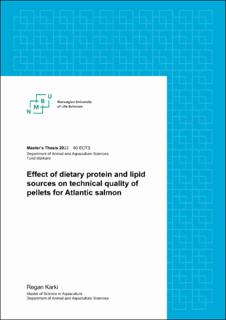| dc.description.abstract | The purpose of the research was to examine technical quality of pellets added protein (P) and oil (O) sources of vegetable (V) or marine (M) origin. Four different diets for Atlantic salmon smolts were produced with 1) marine protein and marine oil (MP/MO), 2) marine protein and vegetable oil (MP/VO), 3) vegetable protein and marine oil (VP/MO/ and 4) vegetable protein and vegetable oil (VP/VO). Additionally, a commercial diet was used as control. The marine protein ingredient was fish meal (61%) while the vegetable protein ingredients were soy protein concentrate (35%), wheat gluten 22%), corn gluten (10%). Fish oil was used in the MO feed and rapeseed oil was used in the VO feed. Wheat was used in all feeds (MP feed 21% and VP feed 8%). The protein and fat content of all feeds were 47% and 22%, respectively.
Measurement of physical quality parameters of pellets included bulk density, durability, fat leakage, hardness, water stability, sinking velocity thickness, colorimetric analysis. Fish feed the feeds were inspected for skeleton development by X-ray as a marker for fish health, in addition to mortality rate.
Plant-based protein and oil sources showed no effect on the velocity of sinking pellets in fresh water as compared to marine-based sources. The average velocity of sinking pellets in saline water was not significantly different between pellets derived from plant and marine sources. Compared to marine-based and commercial meals, plant-based diets (VP/VO) showed lower water stability, stronger durability, and reduced fat leakage in our current study.
In addition, the a-value and b-value of plant-based and marine-based diets differ significantly. The utilization of a plant-based oil source in conjunction with a marine-based protein source has no significant effect on a-value (redness). A similar result can be obtained in the b -value (yellowness) Very low prevalence of spinal deformities were determined and dietary composition did not significantly affect the prevalence. Overall, the plant based diet showed a great potential to substitute the marine based diet in terms of physical pellet quality, further, experiments should examine effects on growth rate, fish weight and bone health condition or deformity concerns later in the sea water. | en_US |

